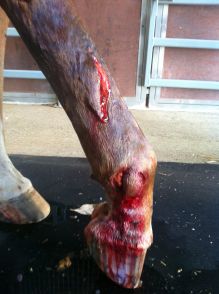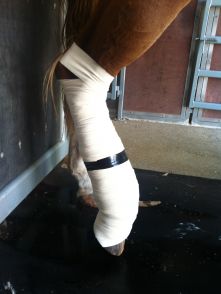Wound Care
Horses can get wounds anywhere on their bodies, including eyes, mouths as well as their outer bodies. Breaking through fences, interacting with other animals and horses and floating accidents are common causes of horse wounds. The first thing you need to establish if your horse gets a wound or injury is first aid. Not all wounds will bleed heavily but the ones that do need a pressure bandage applied before you contact your vet. Once life saving first aid is under control, the next step is to ensure your horse is covered against Tetanus.
Some wounds will need veterinary attention- such as suturing, cleaning and draining. If you have any concerns don’t hesitate to contact us fore more information or advice. General wound care include cleaning the wound, bandage the wound and monitor for signs of infection (redness, discharge, swelling, pain). If any of these signs are apparent, please contact a veterinarian for a consult.




